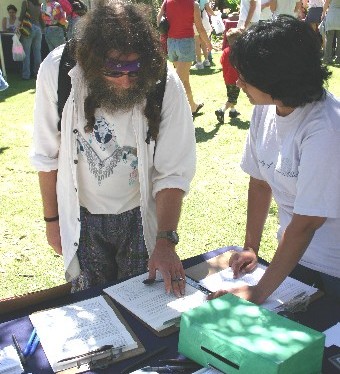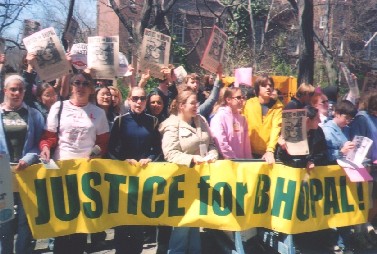| Use It Or Lose It: Shares
in Dow |
 Back to Campaigns
Back to Campaigns
Does YOUR college or university own shares in Dow? Many do –
nationwide, more than $110 million in
Dow stock is owned by colleges and universities. If your school
is one of them, they should use it or lose
it – use it to support the Bhopal
Shareholder’s Resolution or lose it through divestment.
Why Use It Or Lose It?
If your school owns Dow shares, it means they partially own –
and profit from – Dow’s business around the world. It
means your tuition dollars are supporting a company responsible
for human suffering and death the world over,
and that your school owns and profits from Dow’s
crimes. It means your school bears responsibility – the responsibility
to act. And it can do so in one of two ways:
| Shareholder
Progress
Shareholder proposals can help
change company policies that dictate how a company operates,
whether or not they achieve final passage. For example, by
using shareholder proposals, Amnesty
International (in coalition with other investors) has
been able to engage ExxonMobil in a dialogue about the company’s
human rights obligations, moving them to publicly proclaim
that they condemn human rights violations in any form and
indicate their intent to uphold the core labor standards set
forth by the International Labor Organization. Moreover, ExxonMobil
began participating in the Voluntary Principles on Security
and Human Rights, something the company had earlier refused
to do. In addition, Amnesty and coalition partners recently
won two victories with ALLTEL and Carlisle regarding the adoption
of sexual orientation non-discrimination policies, by using
shareholder proposals. |
 Use
it: Support the Bhopal Shareholder’s Resolution Use
it: Support the Bhopal Shareholder’s Resolution
Every year since 2004, concerned shareholders have introduced a
resolution calling on Dow to explain how Bhopal is likely to affect
the company, its reputation, and its finances, and any plan that
the company may have to address the concerns of the Bhopal survivors.
As with every resolution, all shareholders have the opportunity
to vote – in fact, they’re expected to do so, in line
with their role as owners of the corporation. As with most votes,
it’s a pretty simple choice: a yes or no judgment call. Unfortunately
many shareholders choose not to consult their better judgment, preferring
instead to vote as management recommends – and you’ve
got three guesses as to what Dow recommends.
So long as your school is committed to owning Dow shares, it has
a responsibility to use them to vote in favor of the Bhopal
Shareholder’s Resolution. By doing so, your school will
be using its share power to support the cause of justice in Bhopal.
And doing so is easy: share voting is quick, costs nothing, and
they're probably doing it anyway. A vote in favor of the Bhopal
Shareholder’s Resolution isn’t only the right choice
– it’s an easy one.
| Divestment
History
Apartheid
South Africa was based on an "us here, them there"
formula of territorial segregation in which the white-ruled
areas consisted of 87 percent of the country, including the
big cities and most of the arable land. Starting with campus
campaigns and city resolutions, a nationwide divestment campaign
emerged in the 1980s, drawing increasing attention to the
struggle of black South Africans and penalizing any corporation
that supported racism by doing business in the country. The
campaign was the first to convince many public institutions,
including universities, to divest for moral or ethical reasons,
and it ultimately played an instrumental role in pressuring
the South African government to end Apartheid. From that campaign
has sprung others: a successful nationwide campaign against
tobacco investment;
a campaign against
investment in Israel; and an ongoing effort against corporations
doing business with the military
regime in Burma (PepsiCo left Burma after a high profile
campus-based campaign, as did Texaco after the University
of Wisconsin, Madison sold over $230,000 worth of stock). |
 Lose
it: Divest from Dow Lose
it: Divest from Dow
The stronger stand to take is divestment, or selling the shares
your school owns in Dow. In this way, your school or university
would be washing their hands of the company entirely - a profound
public statement to make on behalf of justice. Students at Berkeley
recently succeeded in passing a resolution through their student
government calling on the school to do exactly that. And while your
school may be reluctant to take such dramatic action, there are
compelling moral and financial reasons for them to do so.
Moral: College endowments are wonderful things
– nobody would argue with that – but we shouldn’t
have to measure their cost in human life. The fact that Dow has
not acted to stop the ongoing contamination of tens of thousands
- for which it is responsible - is inhumane, unjust, and immoral.
Dow’s evasion of responsibility in Bhopal means that another
life is lost each day, and there’s no reason why our schools
should profit from the crime through their ownership of stock in
Dow.
Financial: Frankly, Death is a poor investment.
Dow has huge outstanding liabilities in
Bhopal and pretty much every other place
on earth. Don’t take our word for it: the professionals
have said so themselves. Read the detailed financial report Dow
Chemical: Risks for Investors by Innovest Strategic Value Advisors.
If your school owns stock in Dow, they should use it
– or they should lose it. Leaving the choice
open should enable you to form a wider coalition in support of your
campaign, and it should also make a public victory more likely.
Because one way or the other, the hardest position to justify is
the status quo – the act of doing nothing.
- top -
How it Makes a Difference
College endowments and foundations aren’t small change. Endowments
can total hundreds of millions, sometimes billions, of dollars.
The University of California alone has $52 billion combined in its
endowment and other funds. Even a small school can have millions.
Scripps College, for example, has over $200 million. Obviously,
such large shareholders can exert tremendous pressure over a company
and the decisions it makes, and bringing that pressure to bear in
favor of Bhopal offers us a tremendous opportunity. Although resolutions
such as Bhopal rarely approach the 50% threshold required for passage,
sizeable votes in favor can nevertheless be a terribly embarrassing
rebuke for the company and inspire media scrutiny
they’d prefer to avoid. Quite often, corporations will be
prepared to negotiate – and even concede some or all of a
resolution’s demands – in order to prevent a vote which
may prove humiliating to the corporate management.
Divestment is a similar public rebuke to the company, only on a
grander scale. Its significance lies not in its ability to hurt
Dow’s bottom line, but its ability to soil its reputation
and thereby its share price. An ongoing nationwide divestment campaign
casts an understandable pall over a company; the fact that so many
shareholders and venerable institutions are willing to sell their
stock in protest makes a profound statement – and it can be
utterly humiliating to the corporate management. Most will go to
any length to thwart a successful divestment campaign, because if
allowed to continue – well, just
look what can happen. Apartheid and tobacco were painted irrevocably
as moral pariahs by divestment campaigns, and it’s done them
no favors. Our task is adding Dow to the list.
- top -
Campaign Outline
Vision
Dow Shareholders demand justice for Bhopal by publicly divesting
and voting in favor of the Bhopal
Shareholder’s Resolution, embarrassing the company and
forcing it to address the survivors’
demands.
Goals
..........1. Educate
your campus, community, and university administration about Dow’s
responsibility for ongoing chemical terror in Bhopal.
..........2. Organize a widespread campaign,
forcing your school to vote in favor of the Bhopal
Shareholder’s Resolution or to divest from the company.
..........3. Harm Dow’s reputation
and humiliate the company through coverage of your campaign in the
media.
Strategies
..........1. Build a widespread
coalition in support of your efforts
..........2. Pursue the support of students,
faculty, and alumni
..........3. Prepare for the long haul.
Any campaign is likely to last a year or longer before your efforts
are successful.
- top -
Before You Start
 Step
One: Research Step
One: Research
Before you start your campaign, there’s a few things that
you’ll want to know:
..........1. Is YOUR school invested
in Dow? IF SO:
..........2. Who are the persons responsible
for investments? Who makes decisions on how to vote for a shareholder
proposal, or whether to divest? Is it an elected body?
..........3. Have they voted on the
Bhopal resolution in the past and if so, which way did they vote?
Have they, or have they ever considered, filing or co-filing on
a shareholder proposal?
..........4. What are their proxy voting
guidelines, which direct their voting on shareholder proposals?
What is their policy on divestment? Are they in violation of their
own policy?
If you attend a public college or university, information regarding
their investments and policy is public. Anyone can request this
information by contacting them, preferably by a formal letter and
a follow-up call. If that route proves difficult, you should be
able to obtain the information you need with an open
record request. If you attend a private school, you may have
to be a little more creative
with your research.
If it so happens that your school is already a supporter of the
Bhopal
Shareholder’s Resolution, then great! You can still ask
them to take the next step and support the resolution as an active
co-filer.
 Step
Two: Formulate Your Campaign Step
Two: Formulate Your Campaign
Now that you’ve had the chance to assess the information you’ve
collected you should have a clear idea of the demands your campaign
will focus on. Draft a statement outlining these demands, which
will form the basis of your campaign.
- top -
The Campaign
 Step
One: Educate Yourself Step
One: Educate Yourself
Make sure that your group is familiar with the issues surrounding
Bhopal, and that you’re able to speak about them with confidence.
This website and the Amnesty International report on Bhopal, Clouds
of Injustice, are excellent places to start. Links to more detailed
background information is available on our Resources
page. You should also familiarize yourself with shareholder
activism in general, the Bhopal
Shareholder Resolution in particular, other successful divestment
campaigns, and previous divestment efforts at your school.
 Step
Two: Build a Coalition Step
Two: Build a Coalition
Build a coalition in support of your
campaign. Reach out to other organizations in your area –
make sure that you’re not only talking to the “usual
suspects” but that you’re also reaching out to a wide
range of potential supporters, including your local Amnesty
International chapter, community groups, Indian or Indian-American
organizations, ecological or religious groups, NGOs etc. The networking
possibilities are endless!
 Step
Three: Find a Champion Step
Three: Find a Champion
Identify an administrator within the university or a member of the
endowment board that you think will be sympathetic toward your issue.
This is essential. Without an official who will actually take ownership
of the issue and make it his or her cause, it’ll be far more
difficult for you to prevail. You can identify likely champions
by asking your coalition partners for advice and asking around.
Contact your champion. Once you arrange a meeting, try to organize
as diverse a group as possible to represent your cause. By involving
a wide range of coalition partners in the discussion, you demonstrate
that your issue has community support. At the meeting, make a strong
case for why action is important. Most likely, the official will
never have heard about Bhopal before, so you should come prepared
with such background information as the Amnesty International report
on Bhopal, Clouds
of Injustice; the financial report Dow
Chemical: Risks for Investors; and a Bhopal film such as Litigating
Disaster which lays out the complicated legal issues in a brief
and powerful way. You may also want to bring a copy of the Bhopal
Shareholder Resolution, and any brief informational
sheets that might be useful. Although the official may agree
right away – if so, great news! – it’s more likely
that they’ll want some time to go over the information and
consider it. Leave your contact information, but offer to call back
in a week or two and see what they may have decided.
If they do decide to offer their support, ask them to help organize
support - your champion may have more access to other decision makers
than you ever will. They should also help you chart the political
landscape. When meeting with your champion, ask them to predict
which other endowment board members or administrators are needed
for support, and what may be the best approaches to convincing them.
 Step
Four: Building Support Step
Four: Building Support
Generally-speaking, there are three main constituencies that you
should organize on behalf of your campaign. They are:
..........1. Students
..........2. Faculty
..........3. Alumni
..........• Ask the student
government and faculty senate for a resolution
of official support. Contact alumni and wealthy donors to your
school (you should be able to get a nice list from the alumni office)
and ask them to sign on to a formal letter in support of your campaign.
..........• Draft a letter or
petition outlining your demands, based on the response you receive.
Address the letter to the person in charge of the endowment board
and/or your school President or Chancellor. The more signatures
you get for your letters and the more public attention you attract,
the more powerful your campaign will be! As with your initial inquiry,
be sure to attach any relevant information to your letter or petition
when you deliver it.
..........• Use
the media to cover your story and draw attention to your campaign.
Make the case that action is needed. Offer opinion pieces and letters
to the editor to local newspapers.
..........• Organize educational
events and other actions to raise the profile of your
campaign and get more people involved.
 Step
Five: Move When the Time is Right Step
Five: Move When the Time is Right
..........• Allow the university
administration and endowment board to perform their due diligence
as they consider possible actions. Look at this as an opportunity
for more information!
..........• Consult with your
champion as to when a formal proposal should be made to the board.
Make sure that the timing is right.
..........• Prepare for a hearing.
Decide which coalition members should speak. Decide who should say
what.
..........• Make your pitch for
action!
 Step
Six: Assess Your Progress Step
Six: Assess Your Progress
If you’re having trouble receiving a response, continue pushing.
Follow up with a call or visit if more than 2 weeks have gone by
and you haven’t heard from them. If they refuse to answer
all or some of your questions, ask them to reply in writing as to
why they will not provide the information. Remember that a refusal
is not a failure! It can be used effectively in your campaigning.
Letters to the editor or op-eds in your
local newspaper may also be an effective route if officials are
turning a deaf ear.
..........• Assess the response
you receive based on your demands. Consult with your coalition members
about next steps.
..........• If you’re not
satisfied with the response, plan a follow up letter, meeting and
public actions if necessary. Publish the response in your local
paper and other news outlets along with your new demands, if any.
..........• If the response is
favorable, be sure to follow up with thanks. Make a public statement
of appreciation in your local papers.
Remember that your campaign will constantly be evolving based on
the progress you’re making, and how receptive or stubborn
your targets may be. You may need to adapt your campaign demands
based on the responses you receive. If necessary, set escalating
objectives for your campaign.
REPEAT UNTIL YOUR GOALS ARE MET! Like all campaigns, yours might
not be immediately successful, but perseverance will pay off!
 Step
Seven: Share What You’ve Learned Step
Seven: Share What You’ve Learned
Log in to the Amnesty
SHARE POWER forum to learn about similar campaigns across the
country and share what you’ve learned.
More Information
..........• Amnesty
International SHARE POWER campaign
..........• The Social
Investment Forum (Advocacy and Policy Program)
..........• On-line
guidebook for shareholder activists produced by Friends of the
Earth
..........• SRI
Endowment Coalition
..........• Divestment
Action Guide by the Council for Responsible Public Investment
(CRPI) and the Technical Assistance Legal Center (TALC), designed
for use in anti-tobacco divestment campaigns
..........• Educational
Foundations and Endowments: Legal Standards for Tobacco Divestment
by the Technical Assistance Legal Center (TALC)
..........• Legal
Standards of Tobacco Divestment by CRPI and TALC
..........• Public
Fund Restrictions on Tobacco Investments
- top -
Overcoming Objections
You may find that some or all of these objections will be raised
in the course of your campaign. This should help you overcome them.
 The
University Should Not Take a Political Position The
University Should Not Take a Political Position
Because of the University’s position in society as an intellectual
and ethical center, and as a place of learning, it has a responsibility
toward the local and global community. In fact, you may find exactly
this responsibility enshrined in your school’s charter, or
at the very least in the public statements of its leaders and administration.
In order for the University to fulfill its role as a humanistic
institution of higher learning, there must be an institutional commitment
to justice. If your school is invested in Dow, and therefore profits
from Dow’s crimes, your school
bears responsibility – the responsibility to act.
Not acting is itself a political position - one that denies that
the University must act in a socially and morally responsible fashion.
Ample precedent has been set for both support of public-interest
shareholder resolutions and outright divestment by colleges and
universities nationwide, including (possibly) yours. As it stands,
Dow’s continuing inaction in Bhopal represents a serious conflict
with the central values of the University and its humanistic tradition.
 Divestment/Shareholder
Action Leads to a “Slippery Slope” Divestment/Shareholder
Action Leads to a “Slippery Slope”
Board members may oppose divestment or shareholder action because
it introduces social or moral decision-making into what they argue
should be purely financial decisions. There is concern that if an
endowment takes action, it may be forced to consider many different
shareholder actions or divestment requests that come from proponents
of other social or political causes which could detract from their
day-to-day responsibilities.
Whether or not your school’s endowment decides to take action,
other social issues will be raised. Your school will have to decide
on each issue. Some schools have adopted policies to guide their
decision-making on these issues. Either a pre-existing policy or
specific findings accompanying their action can be used later to
distinguish why the endowment took a particular action - and/or
why a new request is not being taken.
 Divestment
is Illegal Divestment
is Illegal
A common argument against divestment specifically is that making
financial decisions based on anything other than financial criteria
is a violation of the endowment’s legal duty to the beneficiaries.
Divestment is totally legal. A Baltimore case about South
Africa divestment held that it was legal (Board of Trustees
v. Mayor of Baltimore). Schools just need to take the proper
steps and fulfill their fiduciary duty. What’s fiduciary duty?
People trusted to manage a fund such as an endowment are required
to be prudent investors and not make rash decisions. They must be
loyal to the beneficiaries of the funds. Violations of that trust
come from doing something illegal, like stealing money, or from
taking too little care in making decisions. Each investment decision
must be well-researched and reasonable at the time it is made. College
trustees must take time and study an issue like divestment before
they make a decision. For that reason, divestment campaigns can
take some time, but be patient. They work.
The governing board of a university endowment or foundation can
choose to divest from Dow so long as the assets are reinvested in
investments of similar risk and projected return. The trustees can
decide that Dow is a bad investment, and that selling the current
holdings and avoiding these investments in the future is warranted
on purely financial grounds. Alternatively, if the board finds that
non-Dow investments offer equivalent risk-adjusted return, and all
other things are equal, the board can sell Dow shares based on non-financial
reasons.
 Voting
for the Bhopal Shareholder Resolution is Too Complicated Voting
for the Bhopal Shareholder Resolution is Too Complicated
Too complicated? Do they also have trouble opening doors and tying
shoelaces? If they continue to insist, then you can suggest an even
simpler solution: selling the stock entirely and divesting.
 Divestment
Costs Too Much Divestment
Costs Too Much
Another common concern is that divestment will create new costs
to the endowment fund. These new costs could arise in three ways:
increased transaction costs, less diversification, and lost investment
revenues.
Endowment funds may be “passively” or “actively”
managed, usually a combination of the two. In the actively managed
portion of their funds, board members (or, more likely, the financial
managers the trustees have hired) may conclude that Dow stocks are
a good investment and will include these stocks in their portfolio.
Most plans also passively manage a portion of their funds by investing
them in a wide range of companies that are part of an index such
as the New York Stock Exchange (NYSE). The goal of passive investment
is to hold a diversified portfolio that rises and falls with the
stock market as a whole as reflected in the index. The endowment
fund would own Dow if it’s included in the selected index.
Diversification can be achieved without Dow. It is true that removing
stocks from passive indexes is not the norm. In practice however,
achieving this outcome usually will be easy. If the endowment fund
has created its own index fund comprised of all the stocks making
up the NYSE, the plan can sell Dow’s shares and from then
on simply passively hold an index designated as the NYSE Ex-Dow.
CalSTRS has done this with a modified Russell 3000 index fund. This
strategy still provides diversification and hence lowered risk,
as well as the low administrative expenses that come with passive
investment. If Dow’s stock ultimately does worse than the
rest of the NYSE, the fund will actually be better off having divested.
Furthermore, because the Dow comprises such a tiny share of the
overall value of the NYSE, it’s extremely unlikely that the
return from the NYSE Ex-Dow will significantly differ from the NYSE
no matter how Dow stocks do in the future.
Incremental selling can minimize costs. Endowment funds that gradually
divest from Dow stocks will be successful in minimizing or avoiding
transaction costs. Selling a large block of stock in a short period
of time can negatively impact a stock’s market value, resulting
in a potential loss of funds for the portfolio. This is typical
supply and demand: if a product is scarce, its value increases;
if a product is abundant – as can be the case when large stock
holdings are sold quickly – its value decreases.
To avoid this, fund managers can sell Dow holdings slowly, so as
not to glut the market and decrease the value of the stock. Incremental
selling of Dow stock is the best strategy to protect the assets
of the fund. Dow holdings can be sold at a time that is most cost-effective
for the fund.
A decision to divest should direct financial managers to do so
within a certain time frame. For example, California’s South
Africa divestment law set forth a period of several years by the
end of which divestment should be completed. Likewise, Massachusetts
required that its tobacco holdings be sold within a three-year period.
The executive director of the retirement board instructed fund managers
to sell all tobacco-related holdings subject to the divestment law
“as quickly and prudently as practicable” within the
three-year period. The managers were given discretion as to how
and when the stocks would be sold, with the proviso that they not
delay the sale unless they could make a compelling case for doing
so. In fact, all of the state’s tobacco stocks were sold within
three months of the governor signing the law.
Cross-trading can nearly eliminate costs. Endowment funds regularly
incur transaction costs based on how often they buy and sell stock.
However, if the shares are cross-traded with other portfolios under
an investment manager’s control, the market impact and transaction
costs can be reduced to practically zero.
Finally, if your school feels that divestment would still be an
unbearable financial burden, then what are they waiting for? Voting
in favor of the Bhopal
Shareholder Resolution costs them absolutely nothing.
- top -
Action Ideas
 Pass
a Student Government Resolution Pass
a Student Government Resolution
Draft a resolution calling on your school to divest, reject Dow’s
funding, or expel Dow recruiters. Present the resolution to your
student government with a supporting petition
from the student body, faculty, and alumni.
 Find out more
Find out more
 Dow
Buildings Dow
Buildings
Do you have a Dow Building (or lounge, or plaza) on YOUR campus?
If so, perhaps you should rename it! Do so at night (if you modify
the signs, make sure your changes cause no permanent damage) or
organize a public ceremony and invite the media.
Tell them about Dow's crimes in Bhopal, and your school's obligation
to act.
Alternately, you can organize a “quarantine” of the
building. Dress in white biohazard
suits and white face masks and advise students that entry into
the building might be unsafe, given Dow's
history of environmental contamination.
If you’re really creative, you can borrow a projector, design
a skull and crossbones slide,
and project it onto your campus Dow building.
 Petitions Petitions
Petitions are the time-honored way of demonstrating public support
for your campaign and can also be a
useful tool for introducing people to an issue. 
Rather than assigning a few people to sit at a table and collect
signatures, it’s more efficient for everyone in the group
to get in on the act, and collect 20 or so signatures per week (or
more if you can) from friends, folks in their dorms, etc. Give people
a basic rap to say, hand out the blank petitions at a meeting and
send them off!
As with other kinds of sign-up sheets, it’s good to put yourself
and a few friends at the top of the sheet so nobody has to be the
first. Keep the original petition and send copies of it to your
target(s).
Add everyone who signs up to a low-traffic “action alert”
email list, so that they’ll know about other opportunities
to support your efforts.
 Balloon
Petition Balloon
Petition
As a creative variation on traditional petitioning, write a brief
slogan (such as “Justice for Bhopal Now”) on helium
balloons and collect signatures on the balloons before tying them
all over campus.
 Alumni
Support Alumni
Support
As a major source of financial support for your school, alumni carry
great weight with the administration. Circulate a sign-on letter
to gather alumni support for your campaign, and make it public if
your school refuses to take action. In extreme circumstances, you
may want to organize an alumni boycott of donations to your school,
or collect donations in a separate fund that you’ll release
to the school when they agree to your demands. Check with your Alumni
Office for a list of major donors to your school.
 The
Run-Around The
Run-Around
Are you getting the run-around from your college or university?
Organize one yourself: run in a circle around the home of your college
President or Chancellor to highlight the treatment you’re
getting from your school, and demand action.
 Blood
Money Blood
Money
Deliver some creatively designed “blood money” to your
school to symbolize its complicity in Dow's crimes in Bhopal –
or plaster the sidewalk in front of Chancellor's house with their
dirty dollars.
 Chalkings Chalkings
Get a couple buckets of sidewalk chalk and decorate campus. Chalking
is cheap, fun, creative, and effective. Some schools don’t
like it, but it’s pretty harmless and if you do it late at
night, you’ll avoid scrutiny. You can use it to educate, advertise,
or put pressure on your administration (Ex.: by chalking the night
before a lot of alumni or parents are visiting campus).
One possibility: sketch body outlines around campus (particularly
around the Dow Building, if you have one, or the President’s
house) and write the names of Bhopal
victims inside, or Bhopal slogans.
 Organize
a Run for Your Life!! Race Organize
a Run for Your Life!! Race
Organize a short race to dramatize and re-create the disaster. Begin
with a (dry ice) gas “leak” (outside a Dow building
if you have one on campus) and urge the runners to dash for safety.
Dress up as the Grim Reaper,
catch people as they flee, and give them death
certificates at the end. Award the “survivors” (the
winners) with “metals” symbolizing the continuing chemical
and heavy metal contamination that burdens the people of Bhopal.
|
At the University
of Michigan, the “Run for Your Life!!” race
served three purposes: raising awareness about the disaster
among the student body in an  engaging
and participatory way; drawing attention to the University’s
unacceptable association with Dow, and garnering valuable
publicity for the campaign. Participants were asked to sign
away their rights by a "Dow representative"
sporting a Pinocchio nose.
The Dow rep spoke grandly about Dow's discussions with survivors
and attempts to develop a philanthropic strategy for Bhopal,
but the runners weren't buying it. Instead they signed allegations
of liability, charging the company with ignoring its clear
legal responsibilities in Bhopal. engaging
and participatory way; drawing attention to the University’s
unacceptable association with Dow, and garnering valuable
publicity for the campaign. Participants were asked to sign
away their rights by a "Dow representative"
sporting a Pinocchio nose.
The Dow rep spoke grandly about Dow's discussions with survivors
and attempts to develop a philanthropic strategy for Bhopal,
but the runners weren't buying it. Instead they signed allegations
of liability, charging the company with ignoring its clear
legal responsibilities in Bhopal.
The race began with a dry ice "gas leak" outside
of the Dow Chemistry Laboratories on Central Campus. Participants
began to cough and soon they fled, chased by a resolute Grim
Reaper sporting a nasty scythe. Before the runners reached
the vicinity of the University Hospitals, more than 40% had
been culled by the Reaper. Death
certificates and stickers reading "I DIED: Ask Me
How" were distributed to those who were caught; the winners
were granted lead and mercury “metals”, symbolizing
the continuing contamination that even the survivors of the
Bhopal disaster continue to face. Water bottles reading "CLEAN
WATER - What Bhopal Lacks" were distributed to all the
participants, who had braved the weather and turned out to
run in spite of near-freezing temperatures. The race received
coverage in the local section of Monday's Ann Arbor News.
|
|
A thousand
bloody handprints of Bhopali children |
 Bloody
Handprints Bloody
Handprints
Build a toxic waste drum out of chicken
wire and paper mache (if you can’t find a real one), paint
it white (red for Dow’s
symbol) and then plant it in a major thoroughfare. As people
pass through, you can ask them to leave their bloody handprints
in red fingerpaint. Then deliver it to a key member of your college
with a demand for action. The same can also be done with a large
cloth banner.
 Put
Dow On Trial Put
Dow On Trial
This is a creative and engaging way of educating the campus community
about the Bhopal disaster. It involves a presentation of evidence,
a prosecution and a defense, and an impartial jury which can convict
Dow on the basis of the evidence presented. You can invite law students,
the mock trial group, or Dow
representatives to participate, and notify
the media - and Dow - of the outcome.
Alternately, you could empanel a group of students as a Grand Jury
and ask them to issue an indictment. A Grand Jury would differ from
a full trial in that:
..........• The standard of proof
is lower. The Grand Jury simply needs to conclude that a "preponderance
of the evidence" suggests that a party is guilty. A conviction
requires reasonable doubt.
..........• In a trial, there
is a prosecutor and a defendant. However the Grand Jury is simpler:
there are no judges or opposing lawyers, only the prosecution and
an impartial body of citizens. Evidence is presented, and on the
basis of that evidence the Grand Jury decides whether or not to
indict. A Grand Jury can also subpoena witnesses and evidence.
..........• An indictment leaves
open the interesting possibility of a response from the company.
In the indictment, you can demand that a Dow representative appear
to stand trial at your school. In the unlikely event that one does
appear, then you could have an actual trial - and that would certainly
be interesting. However what you'll likely receive instead is a
letter from Dow, espousing their PR
talking points, which you'll be able to post for the whole school
to read. If they fail to appear, you can declare them "absconders",
just like the Chief Judicial Magistrate
court in Bhopal, and issue arrest warrants for the Board of
Directors and your University Administration.
The whole process is interactive theater from start to finish,
and it lends itself to media coverage: "Blah University Students
Indict $40 Billion Company for Corporate Manslaughter". You
can even give interviews "in character" as the prosecutor
or as a juror.
 Summon
the "Dow Grim Reaper" Summon
the "Dow Grim Reaper"
Dress up as the Dow Grim Reaper
by painting or taping Dow's symbol on the front of a Grim Reaper
costume. Then cull your student body by handing them “death
slips” that explain how and why your victims have died.
It’s a fun way to spread the word about Bhopal - and let everyone
know who’s responsible.
 Hand
out “Bhopal Water” Hand
out “Bhopal Water”
Concoct a nasty brew of foul-tasting ingredients and hand it out
to students on a silver platter. Dress up as a waiter and approach
people on your college green or in your school’s cafeterias.
Invite them to try the Bhopal water but insist that they sign a
liability waiver in case
of injury or death. Educate yourself beforehand about the
toxins found in actual Bhopal water.
A creative twist: befoul (but do no damage to) a public fountain.
Dress up as Dow executives and angrily assert that the water is
clean, and fine for drinking. Refuse to drink the water yourselves
but insist that others do so.
|
University
of Michigan, 2002 |
 Leaking
Barrels Leaking
Barrels
Dramatize the gas leak with toxic waste barrels and foaming dry
ice. Makes a great spectacle!
 Fasts
or Hunger-Strikes Fasts
or Hunger-Strikes
Public fasts and hunger strikes can be a
powerful way of demonstrating your commitment, generating media
coverage, and winning supporters to your side. Consider a day-long
collective hunger strike, a rotating hunger strike, or an indefinite
hunger strike (although most people can go without food for several
days, consult your doctor). If you’re planning an indefinite
hunger strike, make sure that some of your leaders don’t join
in – they’ll need their energy to organize support behind
your struggle. Be sure to drink lots of water. Fasting is a traditional
non-violent tactic that has been used by women
suffragists, Gandhi, Dorothy Day, political prisoners and others.
If you are going on a prolonged hunger strike (more than 1-3 days),
read up on it first, so you know what you’re doing.
 Rallies Rallies
The purpose of a rally is to show your level of support to your
target, to invigorate your supporters and to attract media attention
to bring new people into the campaign. Rallies can include chanting,
signs, banners, music, marching, street theater, impassioned speeches,
humor, presenting petitions and anything else you like. The advertising
could and should include:
..........• Press releases to
papers, radio, and TV (with follow-up)
..........• Announcements in classes
and to other groups
..........• Chalking on the sidewalks
and blackboards
..........• Mailings to your mailing
list, and calls to your phone list
..........• Posters
|
In front of
the Indian Consulate in New York |
Develop a sensible time-line and make sure everything gets done
on time, with people assigned to specific tasks - as usual, you
can do a good job at a reasonable pace with a lot of people, or
a bad job frantically with just a few. It’s especially important
to have some last-minute advertising the day of the rally - chalk
on the sidewalks the night before, leaflet the day of, etc.
Rallies usually begin with a short introduction by an MC and then
a series of speeches, chants, music, and so on. Some things to help
rallies go well:
..........• Keep speakers on strict
time limits that you warn them about in advance. Have a fearless
MC signal ‘timeout’ if they go over.
..........• Use the rally to promote
your group. You deserve the reward for organizing it.
..........• If it’s outside,
remember to put a rain location on the posters.
..........• Have a good diversity
of speakers (gender, race, etc.) and don’t rely again and
again on the same good speakers. New people need to develop those
skills too, and they’ll have a blast. Trust them.
..........• Have several people
designated as representatives to the press.
..........• Getting people to
crowd together and having colorful banners in the background will
make for good pictures.
..........• Have a few marshals
on hand to direct the crowd, lead chants, and so on.
..........• Make the rally visually
attractive - lots of signs and banners, T-shirts with slogans, costumes
and theater and so on. You can cheaply make full color T-shirts
with color inkjet printers, an iron, and T-shirt transfer paper
(1.50 a sheet). How about a nighttime march, carrying torches? Ooooh!
Press tips:
..........• Find them - don’t
wait for them to find you. Control the media, instead of letting
them control you.
..........• Have several “sound
bites” ready beforehand. Saying these, and repeating them
if necessary, is a higher priority than answering the reporter’s
questions (sad, but true).
..........• Don’t make long-winded
speeches; they’ll be edited to death.
..........• A press packet prepared
beforehand with detailed information might help.
..........• Do what you can to
make the audience well informed - it looks bad for them to say,
“Well, uh, I guess I came cause, well, yah know, I’m
really concerned about stuff.”
 Banner
Drops Banner
Drops
Drop a banner from a high spot. Big Banner. Good photo-op.
 Sit-Ins Sit-Ins
Sit-ins are a tactic that first gained popularity in the Thirties
in the labor movement, then in the Sixties in the Civil Rights movement.
They have recently gained notoriety for their successful use by
the student anti-sweatshop movement. Occupying (or sitting-in) a
building is one of the strongest non-violent forms of action that
a group can take. By sitting in your school president’s office,
or an important part of the administration building, you reduce
their ability to operate. The result can be anything from confusion,
to intense hostility, to capitulation. You risk punishment and arrest,
but by acting boldly you’ll get extensive media coverage and
greatly increase the likelihood of negotiations and their success.
You should NOT hold a sit-in until you have worked
through the initial stages of educating people and holding one or
more protests. A sit-in is a last resort, and should
not be done out of the blue. However if, after having worked on
an issue for a long time, you’re hitting your head against
a brick wall, then the time might be ripe for a sit-in.
You’ll need a core group of people to start the effort. Organize
a series of meetings over the course of which you introduce and
discuss the sit-in option. Don’t force reluctant people to
commit, but over a couple weeks build up a list of people willing
to sit-in. Get them to sign a pledge and repeatedly verify that
they are comfortable doing so. Aim for group consensus on the decision
to sit-in. Members who do not want to sit-in will hopefully be supportive
of those who do, and you need some activists on the outside to organize
rallies in your support. Discuss what you’ll do if security
tells you to leave. Scout out the site. It should be strategic (a
site of power), ideally near the center of campus (where you can
gather supporters), and large enough to accommodate your group of
people for a couple days or more.
To avoid security stopping you before you can get in the building,
you should keep the discussion of doing a sit-in off all email lists
(especially details of date and time). Rely upon word-of-mouth,
calling people and group meetings.
|
Don't
forget your hippopotamus |
Here’s a list of things to bring:
..........• Backpacks
..........• Food and water
..........• Deodorant (and other
personal hygiene items)
..........• Blankets, sleeping
bags, pillows
..........• Books, cards, homework
..........• Cameras
..........• Signs
..........• Laptops
..........• Cellular phone(s):
to call outside supporters and the media
..........• List of outside supporters
and media to call
..........• Scanner radio: for
$50-$100 you can buy a handheld scanner that will let you listen
to your security and city police, hopefully giving you advance warning
before they take any action (though using it to do so is slightly
illegal). Tip: Try Ebay or this
site for a cheap scanner. Also you should be able to find a
list of frequencies on the web.
..........• Reporter(s): the more
reporter present, the better you will get treated by your target
(the more likely they are to negotiate and grant your demands).
..........• Don’t overpack.
You might have the freedom to come and leave, in which case you
can arrange to deliver assignments and stay on top of your courses.
Leave the space neat and tidy. Don’t punish the underpaid
secretaries and janitors who will have to clean up any mess you
leave.
- top -
Resources
..........• Handouts
and fact sheets about Bhopal
..........• Draft
Media Advisory/Press Release
..........• Bhopal
Posters
..........• Draft
advertising poster
..........• Draft Bhopal Quartersheets:
One & Two
..........• Survivor
testimonials
..........• Partial
list of dead & injured
..........• Bhopal
poetry
..........• Bhopal
graphics
..........• Bhopal
slogans
..........• Understand
your rights
..........• Request
a sample of Bhopal water or an educational resource
..........• Amnesty International
report: Clouds
of Injustice
..........• In-depth
background information
..........• The financial report
Dow
Chemical: Risks for Investors
..........• Effective
Campus Petition Drives: A Strategy
..........• Sample petitions for
students and faculty
to sign
..........• Health
facts for hunger-strikers (courtesy of United Students Against
Sweatshops)
..........• Publicity fliers (One
& Two) about the Bhopal Photo
exhibit at the University of Michigan
..........• A bus
advertisement about the Bhopal Photo exhibit at the University
of Michigan
..........• Check with university
or city officials to see whether your "Run for Your Life!"
race needs a permit.
..........• You may require insurance
for a "Run for Your Life!" race. K&K
Insurance offers reasonable rates.
..........• Publicity fliers (One
& Two) about the "Run
for Your Life!" race at the University of Michigan
..........• A "Run
for Your Life!" ad that ran in the Ann Arbor News
..........• A bus
advertisement about the "Run for Your Life!" race
at the University of Michigan
..........• Health
facts for hunger-strikers (courtesy of United Students Against
Sweatshops)
..........• Sit
in! A Tactical Analysis by Aaron Kreider
- top -
|
 IN
BHOPAL
IN
BHOPAL





 Step
Five: Move When the Time is Right
Step
Five: Move When the Time is Right



 engaging
and participatory way; drawing attention to the University’s
unacceptable association with Dow, and garnering valuable
publicity for the campaign. Participants were asked to
engaging
and participatory way; drawing attention to the University’s
unacceptable association with Dow, and garnering valuable
publicity for the campaign. Participants were asked to 
 Put
Dow On Trial
Put
Dow On Trial
 Hand
out “Bhopal Water”
Hand
out “Bhopal Water”
 Leaking
Barrels
Leaking
Barrels Fasts
or Hunger-Strikes
Fasts
or Hunger-Strikes Rallies
Rallies
 Banner
Drops
Banner
Drops Sit-Ins
Sit-Ins